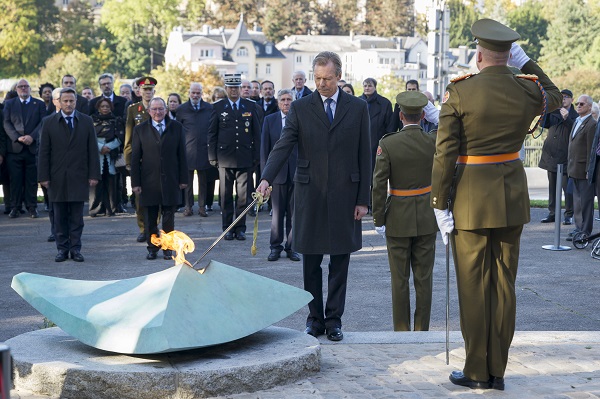 Grand Duke Henri rekindling the flame of remembrance at Kanounenhiwwel on this day in 2023;
Credit: © SIP / Jean-Christophe Verhaegen
Grand Duke Henri rekindling the flame of remembrance at Kanounenhiwwel on this day in 2023;
Credit: © SIP / Jean-Christophe Verhaegen
Luxembourg's National Remembrance Day has its origins in the census of 10 October 1941
According to a statement issued by the Luxembourg government to be published today, Saturday 12 October 2024: at the time, the Nazis wanted to know, among other things, whether the inhabitants of the occupied Grand Duchy of Luxembourg were Jewish and what their nationality, mother tongue and "race" were. The resistance called for the last three questions to be answered with "Luxembourgish". Many people followed this call, which led to the census being cancelled.
"On this special day, it is above all our duty to remember the past and learn from it for our future.
This year in particular, we commemorate the 80th anniversary of the Liberation. On 9 and 10 September 1944, the first American troops arrived in the Grand Duchy. A moment of great joy for many of our fellow citizens who had not lost hope and continued to believe in the principles of freedom and democracy.
The relief in the country after the liberation by American troops was great, but unfortunately it was not yet the end of the Second World War. A few months later, on 16 December 1944, a new misfortune would befall our country and its inhabitants with the beginning of the Battle of the Bulge. Entire villages and towns were destroyed. Hundreds of civilians perished. And more than ten thousand soldiers fell in one of the deadliest battles.
For many of our fellow citizens, the liberation did not mark the end of the Nazi dictatorship either. Until the end of the Second World War, many concentration camps in Europe remained places of systematic torture and murder, especially for Jewish families as well as for women and men who had engaged in the resistance. Women and men who were forcibly conscripted had to continue to work and fight for Hitler's Germany or were taken prisoner of war. Forcibly displaced families continued to dream of seeing their homeland again.
But from today's perspective, the liberation of 80 years ago marked above all the beginning of a new era for Luxembourg and Europe. A time marked by the return of freedom and democracy, reconstruction, solidarity and commitment to international organisations. A period of 80 years of peace for our country.
Today, as war rages again in Europe, as extreme ideologies try once again to divide society, it is important that we do not forget this solidarity and commitment, and that we continue to commit ourselves to freedom, peace and democracy, at home and beyond our borders."
Luc FRIEDEN, Xavier BETTEL, Martine HANSEN, Claude MEISCH, Lex DELLES, Yuriko BACKES, Max HAHN, Gilles ROTH, Martine DEPREZ, Léon GLODEN, Stéphanie OBERTIN, Georges MISCHO, Serge WILMES, Elisabeth MARGUE, Eric THILL








